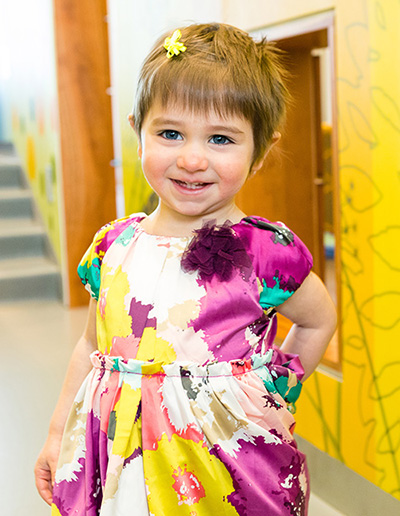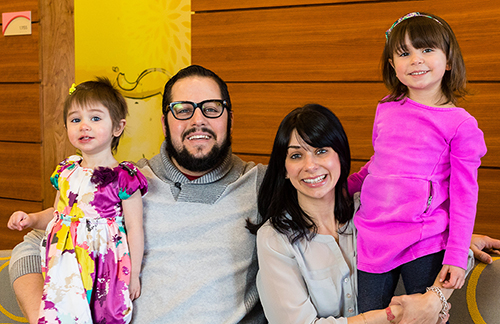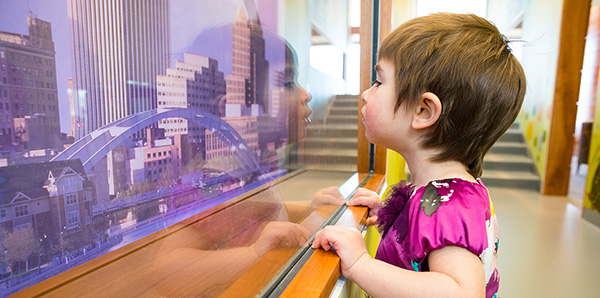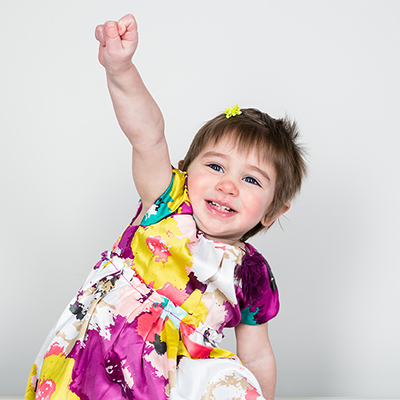Miracle Kid: Arianna Stewart
Grapefruit-sized Tumor Leads to Complicated Treatment, Surgery
 The average grapefruit usually grows to about 12 centimeters in diameter. The average size of a baby girl’s liver is four to five centimeters. But somehow, six-month-old Arianna Stewart had a tumor the size of a grapefruit growing in her liver.
The average grapefruit usually grows to about 12 centimeters in diameter. The average size of a baby girl’s liver is four to five centimeters. But somehow, six-month-old Arianna Stewart had a tumor the size of a grapefruit growing in her liver.
A Parent’s Intuition
Arianna was living a seemingly typical life as an infant. She was growing and eating, but her parents sensed that something was wrong. She had a lump that had formed on her stomach and her parents were monitoring it closely.
“There was a little bump next to her belly button that bothered us from the day she was born,” said her father, Brandon Stewart. “Every meeting that we had with our pediatrician we were told it was a herniated muscle and not to be worried.”
Brandon and his wife, Vanessa, continued to do their due-diligence, researching potential causes of the bump. At each appointment, they were sure to check in with their pediatrician and ask about what could be causing it. By the time of Arianna’s six-month check-up, the Stewarts wanted some answers. Their pediatrician referred them for an ultrasound at UR Medicine’s Golisano Children’s Hospital.
After arranging care for their other daughter, Leila, they brought Arianna in for her ultrasound. Then, all they could do was head home and wait for the results. The minutes seemed to blur together from there.
“I remember getting the phone call saying that Arianna had a growth on her liver that could be cancerous,” said Brandon. “As an employee at Strong Memorial Hospital, I’ve seen kids hooked up with IVs and you never think for one minute that it might hit home, but it did.”
 A Divine Sign
A Divine Sign
The next day, Arianna would undergo more tests—an MRI, CT scan and blood tests. Little did the Stewarts know that was the day their lives would change forever. Arianna’s AFP, a tumor marker used to help detect and diagnose cancer of the liver, was elevated to 257,000, whereas the average child her age has a range of 0-7.
Arianna was diagnosed with hepatoblastoma, a rare tumor accounting for just one percent of pediatric cancer diagnoses.
“The pooching of Arianna’s stomach actually had nothing to do with what we found in her liver,” said David Korones, M.D., Arianna’s oncologist. “It was kind of like a divine sign—something that led to early detection of the tumor. Had it been found later, it would have been a major problem that could have flipped her odds from a very curable to a very-hard-to-cure cancer.”
Arianna’s liver tumor was quite large—making the treatment and surgical removal of the tumor especially difficult. But fortunately, it had been entirely confined to Arianna’s liver, and had not spread to other areas of her body.
“It could have been a different story. If it had grown to involve several different areas of the liver, it might not have been able to be removed—which is the only way to cure it,” Korones said. “If that had happened, the only way they could have cured it would have been to remove her liver and give her a transplant, which is pretty high risk while being treated for cancer.”
 Treatment
Treatment
“You have to put this into context, this was a beautiful six-month-old baby who wasn’t having a problem in the world,” Korones said. “Brandon and Vanessa were kind of numb, but what impressed me is that even as devastated and shell-shocked as they were, they still had the presence of mind to ask really good, really challenging questions.”
Korones consulted with other centers prior to administering Arianna’s treatment. He talked with Walter Pegoli, M.D., Chief of Pediatric Surgery at Golisano Children’s Hospital, and formed a game-plan for her care, which included giving Arianna six rounds of chemotherapy, two or three rounds before the surgery, and three or four rounds after the surgery.
Without chemotherapy, Pegoli couldn’t attempt to remove the tumor—Arianna wouldn’t have had enough liver to survive. They explored all options, even a primary resection and a liver transplant, but in a child as small as Arianna, it was not feasible.
“The toughest part about giving a child chemotherapy—and Arianna was on the strongest, most intense chemotherapy—is that in order to get better, she had to get sicker,” Korones said. “She responded so well that Walter could do the surgery after two rounds of chemotherapy.”
Surgery
One of the largest risks for a hepatoblastoma resection is being unable to remove the entire tumor. Arianna's tumor in particular was bulky and in close proximity to major vessels of the vascular structure that feed or drain the liver. After two rounds of chemotherapy, Arianna’s tumor had shrunk in size by 50 percent, and Pegoli could attempt to remove the tumor.
“The entire day was very nerve-wracking. It was the longest day ever,” Brandon said. “It's a blur now, and it was a blur then—our minds were racing.”
“It was a pretty big tumor that involved a very large portion of the right lobe of her liver and also extended into the left side,” said Pegoli. “We ended up having to do a pretty major liver resection in close proximity to some of her major arteries.”
 One of the major concerns for children like Arianna is that the remaining portion might not be up to the job. Pegoli also worried about infection and the leaking of bile from her liver edge. He also had to make sure he wasn't leaving any of the tumor behind.
One of the major concerns for children like Arianna is that the remaining portion might not be up to the job. Pegoli also worried about infection and the leaking of bile from her liver edge. He also had to make sure he wasn't leaving any of the tumor behind.
Today
The Stewarts brought Arianna in for four more inpatient chemotherapy treatments after her surgery. Statistics gathered by Korones supported the completion of six rounds of inpatient chemotherapy to fully fend off the tumor.
Arianna rang the “End of Chemo Bell” on July 26, 2016, signifying Arianna’s triumph over cancer. Surrounded by her family, she was declared cancer-free. She turns two years old on July 6, 2017.
“Staying here at Golisano was one of the best decisions because we were able to keep our support group around us – not just for us, but for Leila and Arianna,” Brandon said. “7North became like our home, so much so that Arianna learned how to walk at the hospital.”
Make a gift to Golisano Children's Hospital and help other kids, like Arianna, receive the care they need.